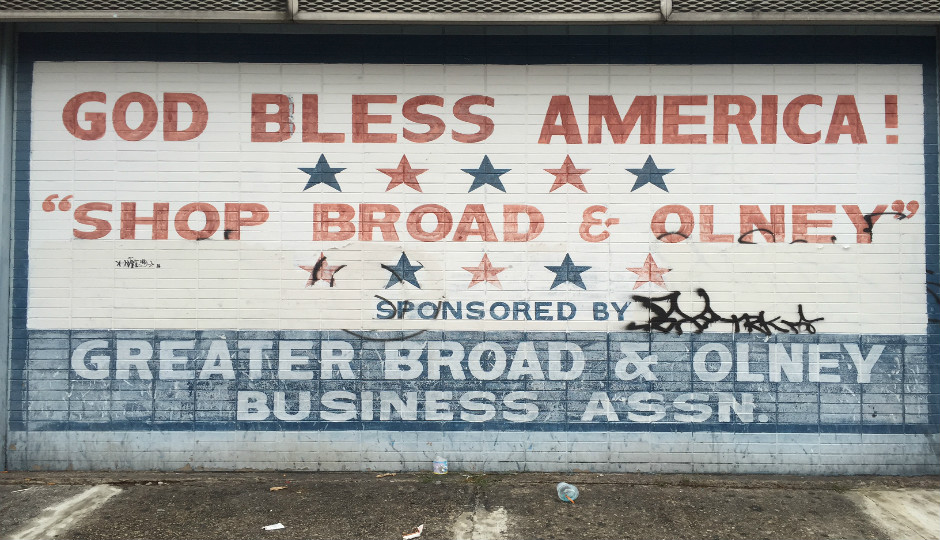The DNC — From the Other End of Broad Street

A faded sign near Broad & Olney, 12 miles from the DNC festivities at the Wells Fargo Center.
The sky started to turn the color of charcoal on Monday night as David El leaned against a wall outside SEPTA’s busy Olney Transportation Center. Oh, how he hoped the bus would show up before the thunderstorm that was growing closer by the second.
About 10 miles south on Broad Street, politicians, celebrities and journalists were safely ensconced inside the Wells Fargo Center for the first night of the Democratic National Convention. It’s a big damn deal for the city, this convention, but let’s face it: The activity and media attention and spending is just limited to pockets of South Philly and Center City. El, 36, imagined what he might say to some of the fancy suits if they somehow made their way to this weathered corner in North Philly.
“My idea would be for them to just spend a week with a family, a real family up here that goes through struggles every single day, as opposed to sitting back in an office every day,” he said. “Spend a week with a mother who’s single and has five children, but still goes to work, goes to school, and knows for so many hours of the day, she has to leave her children in the care of somebody else.”
A head-rattling clap of thunder followed, giving way to a blinding downpour. Connie Carter, 42, huddled with her 5-year-old nephew and 7-year-old niece under a nearby bus shelter. The rain started to move sideways. She rattled off a list of concerns she’d love to bend a politician’s ear about: street crime, trash on the streets, education funding, stagnant wages.
She’d like to believe Hillary Clinton would address some of those issues if she’s elected president. “I know Trump won’t,” she said. But it’s not easy for her to believe that a presidential candidate — or any politician, for that matter — would try to improve the lives of working class people in the inner city. “I just think the way this world is now, I think everybody is out for themselves, and worried about what they can get, regardless of whether they’re rich, poor, black, white,” Carter said.

Adrian Gilliam and his daughter, Summer, try to raise money for a youth program on Lehigh Avenue.
Earlier in the evening, Adrian Gilliam and his 8-year-old daughter, Summer, stood in the middle of Lehigh Avenue near Broad, trying to grab the attention of passing drivers. The sun was beating down on the asphalt, and Gilliam was thumping a choppy beat on a drum. The father-daughter duo were raising money for a drill team Gilliam said he’s setting up for neighborhood kids.
Gilliam, 28, said he’s had discussions about having the team practice at the Greater Enon Baptist Church at 22nd and Lehigh. The goal is simple — to keep young people busy and out of trouble. “If that means putting down a gun and picking up a drum, that’s what you have to do,” he said. “I’ve been living in Philadelphia for 28 years. I’ve seen shootouts, car chases, and people getting killed. I just wanted to start a program so I could give back to my community.”
Summer ran over, clutching a little green jar that was filled with change and $1 bills that motorists had handed her. “Daddy, look at that bird eating that gum! That bird is nasty,” she laughed, pointing at a sparrow sitting in the street. Gilliam wiped sweat from his forehead. He nodded towards the other side of Lehigh Avenue. Claimed he saw four people get shot at between 15th and 16th streets recently, another episode in a never-ending show that always ends with local people being shot or traumatized. “Violence,” he said, “is the one thing that really needs to be straightened out here.”
Jarvis Summers sat on a folding chair on the sidewalk closer to Broad, next to a small table that was filled with knockoff sunglasses, hand bags and school bags. He’d just gotten home from Upper Darby, where he works in security, and stopped to visit the vendor who sells the glasses and bags.
Summers, 34, said if he needs a belt or a new pair of shades, he buys ’em from this stand. Better to keep money in the neighborhood — which desperately needs it — than giving it to some chain downtown. There’s no getting around the quicksand-like poverty rate; a Pew Charitable Trusts “State of the City” report in 2015 found that the median household income in this portion of North Philly was a mere $24,233.
“If they could boost the minimum wage, that could help the middle class,” Summers said. “Because sometimes it’s like you’re living check to check. As soon as I get my check, it’s already gone, even before I spend anything.”
Follow @dgambacorta on Twitter.


